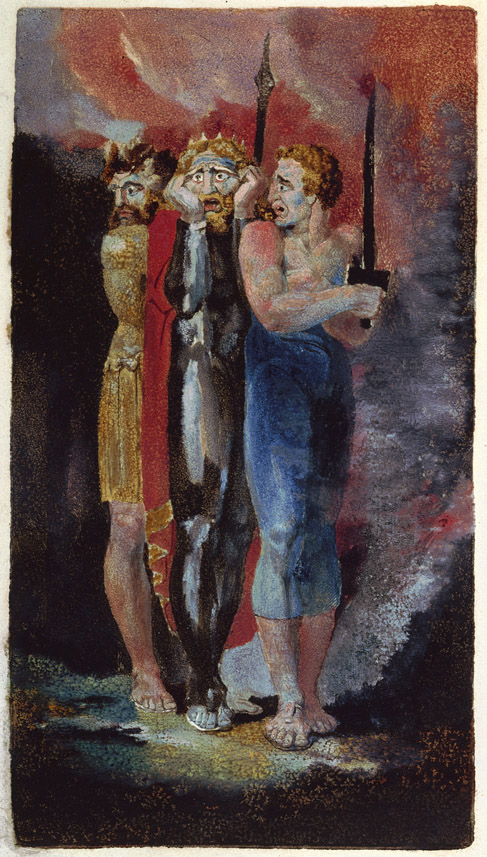 |
| Wikipedia Commons Large Book of Designs The Accusers |

Link to image from British Museum
Link to image from National Gallery
Blake created a print in 1793 which he was to reuse several times because it expressed so well his political, spiritual and psychological views. He first called the image 'Our End is Come.' Erdman, in Prophet Against Empire (Page 206), describes it as 'the hysterical king, flanked by two chief warriors who grip sword and spear, [who] stands inside a threshold enveloped in flames.' The second issue was captioned, 'When the senses are shaken, And the Soul is driven to madness', to suggest the madness of the king. In the third version the caption below the picture reads: 'A Scene in the Last Judgment / Satans' holy Trinity The Accuser The Judge & The Executioner'. Above the Picture we see: 'The Accusers of Theft Adultery Murder'; with the words 'Theft', 'Adultery' and 'Murder' labeling the three men.
The madness of the king refers to the episodes of madness that King George III experienced in 1788-9 and later in his reign. King George's militarism is represented by the warrior on his right, his political tyranny by the counselor on his left. There was much in the British government of which Blake disapproved, and he suggested it in the picture. But the consequences to those who committed destructive acts is most evident in the faces of the men portrayed. They exhibit the sorrow, terror, despair and fear which they had caused others to experience through war, impoverishment, imprisonment and oppression.
Erdman suggests that in labeling the picture 'The Accusers of Theft Adultery Murder', Blake had made a bitter jest: 'those who accuse are guilty and those who judge will be judged by the flaming sword; and the executioner shall be consumed in the conflagration of his own igniting.' (Page 207)
Erdman continues on Page 208: "The king in his expression of amazement bears kinship to the kings as accusers of adultery in Queen Emma and Jane Shore... Burke in speeches and pamphlets in which he raised the property question accused both France and English radicals of intending theft ('levelling'). Pitt was an accuser of Murder when he urged Parliament to arm against France because of the murder of the King of France..."
Blake describes Satan as the accuser. In the inscription Blake names the accusers as Satan's Holy Trinity. The state of error which Satan represents, is to be annihilated at the Last Judgment. The accusers are aspects of Satan, the selfhood. They become what they see (or they see what they have become). As error they have no permanent existence and may well say "Our End Is Come."
Four Zoas, Page 107 [115], (E 380)
"There is a State namd Satan learn distinct to know O Rahab
The Difference between States & Individuals of those States
The State namd Satan never can be redeemd in all Eternity"
Milton, Plate 23 [25], (E 119)
"lest they write them in their Books, & in the Scroll
Of mortal life, to condemn the accused: who at Satans Bar
Tremble in Spectrous Bodies continually day and night
While on the Earth they live in sorrowful Vegetations
O when shall we tread our Wine-presses in heaven; and Reap
Our wheat with shoutings of joy, and leave the Earth in peace"
Descriptive Catalogue, Page 86 ,(E 564)
"as he came at first to deliver those who were bound under the
Knave not to deliver the Knave He Comes to Deliver Man the
[Forgiven]
find any where that Satan is Accused of Sin he is only accused of
Unbelief & thereby drawing Man into Sin that he may accuse him.
Such is the Last Judgment a Deliverance from Satans Accusation
Satan thinks that Sin is displeasing to God he ought to know that
Nothing is displeasing to God but Unbelief & Eating of the Tree
of Knowledge of Good & Evil"
Descriptive Catalogue, Page 92, (E 565)
"Forgiveness of Sin is only at the Judgment Seat of Jesus the
Saviour where the Accuser is cast out. not because he Sins but
because he torments the Just & makes them do what he condemns as
Sin & what he knows is opposite to their own Identity"
2 comments:
I enjoyed reading thhis
This is a powerful and thought-provoking image.
Post a Comment